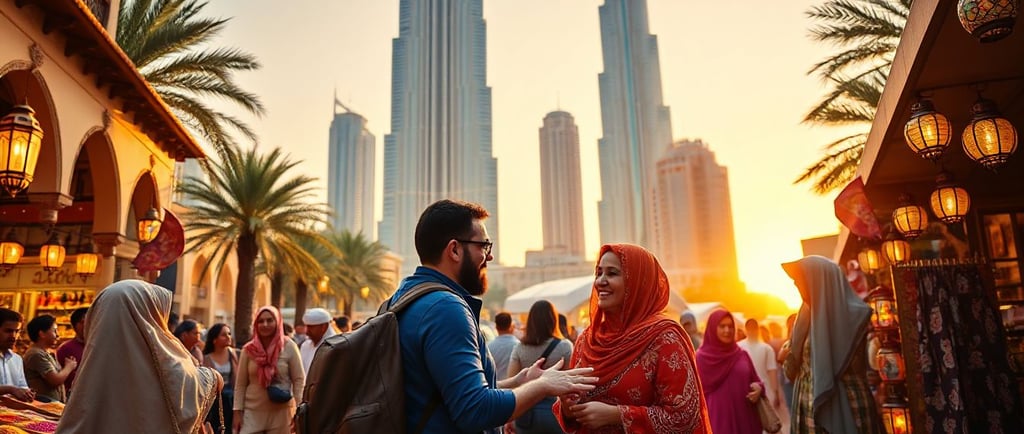Top 10 Arabic Phrases Every Visitor Should Know Before Visiting the UAE
Learn essential Arabic phrases and words to enhance your travel experience in the UAE. Perfect for tourists in the Emirates, these simple arabic words help you communicate, show cultural respect, and connect with locals more meaningfully.
7/6/20253 min read


Introduction
The UAE is one of the world's top travel destinations, attracting millions each year. As a visitor, learning a few simple Arabic phrases can unlock deeper cultural experiences. Knowing these words helps you connect with locals and avoid misunderstandings. It shows respect for Arab customs and enhances your overall trip. The UAE is a melting pot of cultures, but embracing the local language creates more genuine interactions. It’s a step that makes your journey smoother and more meaningful.
Understanding the Significance of Arabic in the UAE
The Role of Arabic as the Official Language
Arabic is the official language in the UAE. You’ll see it everywhere—from government signs to street labels and official documents. Even if most people speak English, Arabic remains key to everyday life. It’s more than a language; it’s part of the country’s identity.
Cultural Respect and Etiquette
Using Arabic words shows respect. It’s appreciated when foreigners try to speak even a few phrases. It demonstrates you’re making an effort to honor local customs. For example, greeting someone with "As-salamu alaykum" shows you value their traditions. Small gestures like this can lead to warmer, friendlier exchanges.
Practical Benefits of Knowing Arabic Phrases
Knowing common phrases helps you get around easier. Ask for directions, handle shopping, or order food confidently. It also helps you build trust with shop owners, taxi drivers, and officials. These simple words can turn a basic interaction into a more personable experience.
Essential Greetings and Polite Expressions
Hello and Good Morning / Good Evening
"As-salamu alaykum" — This means "Peace be upon you." It’s the most common greeting and works any time.
"Marhaba" — A friendly "Hello," suitable at any time.
"Sabah al-khair" — "Good morning," used in the early hours.
"Masa' al-khair" — "Good evening," perfect in the evening hours.
Thank You and Please
"Shukran" — "Thank you," a must-know for showing appreciation.
"Min fadlak" / "Min fadlik" — "Please" (masculine/feminine). Use it when making requests politely.
Excusing Yourself and Apologies
"Afwan" — "Excuse me" or "You’re welcome."
"Aasif" — "Sorry" or "Excuse me" when bumping into someone or needing attention.
Using these polite phrases can make a huge difference. They open doors to friendly conversations.
Practical Phrases for Navigation and Transportation
Asking for Directions
"Fein?" — "Where?" It’s handy when asking for directions.
"Kayf almashar?" — "How to the market?" or more generally, "How do I get there?"
Using Public Transport
"Hal hatha taxi?" — "Is this a taxi?" to confirm if a vehicle is for hire.
"Mumkin tasawwar?" — "Can I take a picture?" important in certain places.
Road and Street Signs
Look for signs with words like:
"Mintaqa" — "Area"
"Sharia" — "Street"
"Madhour" — "Roundabout"
Recognizing these helps you navigate confidently.
Essential Phrases for Shopping and Markets
Haggling and Price Inquiries
"Kam thaman hada?" — "How much is this?" Useful in markets.
Bargaining politely can often reduce the price. Say, "Mumkin takhfid?" — "Can you lower it?"
Asking for Specific Items
"Areef mabsout?" — "Do you have...?" For example, "Areef mabsout al-lahm?" — "Do you have meat?"
"Law samaht" — "Please," when requesting something politely.
Paying and Tipping
Using phrases like "Aref al-fada" — "I will pay," ensures clarity during transactions.
Tipping is common. Saying "Shukran" when giving a tip shows gratitude.
Dining and Hospitality Phrases
Making Reservations and Asking Menu Questions
"Hali mumkin...?" — "Is it possible...?" For reservations or special requests.
"Shu hadha?" — "What is this?" useful when puzzled by a dish.
Ordering Food and Drinks
"Ureed..." — "I want..." For example, "Ureed shai" — "I want tea."
Be polite when ordering, adding "Min fadlak" at the end.
Handling Issues or Complaints
Use phrases like "Mumkin nashkur" — "Can we have..." if correcting an order.
Being polite helps settle problems smoothly.
Emergency and Safety Phrases
Seeking Help
"Ayn al-hospital?" — "Where is the hospital?"
"Ayeen al-shurta?" — "Where is the police station?" Critical in emergencies.
Contacting Authorities or Emergency Services
Know how to say your need clearly in Arabic. Keep your words simple: "Help," "My address," or "I am lost."
Understanding Basic Emergency Instructions
Signs often have phrases like:
"Tabeeb" — "Doctor"
"Harraas" — "Guard" or "Security"
Recognize these for fast help.
Cultural Tips for Using Arabic Phrases Effectively
Always try to pronounce words gently and respectfully. Use formal phrases in most situations. Showing that you’ve made an effort impresses locals—genuinely. Sometimes, a smile paired with a greeting is enough to bridge any language gap. Remember, locals appreciate visitors who respect their language and customs.
Conclusion
Mastering these top 10 Arabic phrases significantly enhances your trip to the UAE. They help you navigate easily, show respect, and foster genuine connections. Keep practicing as you go along—language is just one part of the cultural experience. Engage sincerely with locals, use gestures, and stay open-minded. Your effort in speaking Arabic, even if limited, makes your journey more memorable and respectful of the rich UAE culture. The more you learn, the more your adventure transforms from ordinary to extraordinary.
EmiratesHotels.org
Discover blogs, book hotels, and flights easily.
© 2025. All rights reserved.